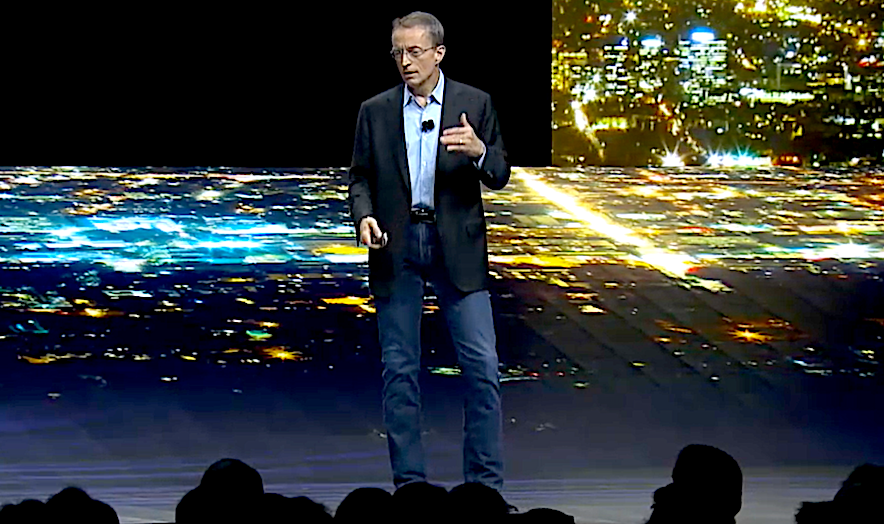 CLOUD
CLOUD
 CLOUD
CLOUD
 CLOUD
CLOUD
Updated:
VMware Inc.’s transition away from a seller of commodity data center infrastructure to a well-rounded solution provider continues apace judging by another strong earnings report today.
Third-quarter earnings of $1.56 per share came in a nickel better than consensus estimates and up 26 percent from the same quarter a year ago. Revenues rose 13.5 percent, to $2.2 billion, beating consensus estimates of $2.17 billion.
Reflecting what Chief Executive Pat Gelsinger (pictured) said appears to be a broad-based increase in technology spending that “will be sustainable for many years to come,” VMware issued a bullish forecast. It raised full-year fiscal 2019 total revenue guidance more than $60 million to $8.882 billion and offered high-end earnings per share guidance of $6.22, up from its previous guidance of $6.14.
Wall Street investors smiled, bidding VMware shares up nearly 2 percent in after-hours trading. The company is one of the few tech stocks to have fully recovered from the selloff of the past month. Update: Shares were up 2.5 percent in late trading Friday.
Executives said the company’s strategic moves in the cloud market, which include its growing partnership with Amazon Web Services Inc. and acquisitions of CloudHealth Technologies Inc. and Kubernetes specialist Heptio Inc. vindicate its confidence in the resilience of hybrid cloud and its strategy of helping customers navigate a multi-cloud world. “The world is aligning to the view we’ve been taking for the last five or six years of the hybrid opportunity,” Gelsinger said.
The CEO also stressed that VMware has moved completely away from selling basic compute infrastructure and toward a solutions focus.
“We almost never sell compute any more,” he said. “We sell VMware Cloud Foundation, fully hyperconverged solutions with VxRail and a combination of security and compute. Almost everything is aligning against hybrid cloud, network security and digital workspace to deliver a higher value proposition.”
Not long ago, VMware was seen as being vulnerable to the twin threats of cloud computing and software containers, which are essentially miniature virtual machines. However, the company has successfully pivoted to become a cloud enabler and to bundle virtualization with value-added services.
Gelsinger was particularly high on the company’s new vSphere Platinum Edition, which integrates its AppDefense endpoint security product with its flagship vSphere virtualization. “Making security intrinsic [to the virtual machine] is flipping the security industry on its head,” he said. “We’re out to change security in a fundamental way.”
“So far, so good,” said Charles King, president and principal analyst at Pund-IT Inc. “VMware is adapting to new technologies and trends as it sees fit. Meanwhile, it remains one of the enterprise sector’s most trusted vendors.”
Gelsinger also pointed to this week’s blockbuster announcement by Amazon.com Inc. of an on-premises version of the Amazon cloud that includes VMware virtual machines as evidence of the fruits of its growing slate of partner relationships. The company’s new VMware Cloud Provider Program, which comprises a combination of VMware and third-party cloud products, now counts 4,200 cloud partners. “We are seeing great momentum in that business,” Gelsinger said.
VMware doesn’t break out revenue by product line, but CFO Zane Rowe offered a few growth highlights. License bookings for the NSX virtualization and security portfolio grew 40 percent and nine of the company’s top 10 deals in the quarter included NSX. The vSAN storage virtualization layer grew nearly 50 percent. Cross-sales with the company’s Dell Technologies Inc. parent also contributed $700 million in revenue in the quarter.
VMware is also showing strength in regional diversification. International sales grew more than 19 percent and now make up a larger share of the company’s revenue than domestic sales.
“People have been incorrectly prophesying VMware’s demise for the past half-decade, but evolutionary technologies like Kubernetes tend to move at a fairly stately pace among enterprise clients,” King said. “The longer VMware has to adapt to upstart players and solutions, the less risk it will face.”
Support our mission to keep content open and free by engaging with theCUBE community. Join theCUBE’s Alumni Trust Network, where technology leaders connect, share intelligence and create opportunities.
Founded by tech visionaries John Furrier and Dave Vellante, SiliconANGLE Media has built a dynamic ecosystem of industry-leading digital media brands that reach 15+ million elite tech professionals. Our new proprietary theCUBE AI Video Cloud is breaking ground in audience interaction, leveraging theCUBEai.com neural network to help technology companies make data-driven decisions and stay at the forefront of industry conversations.